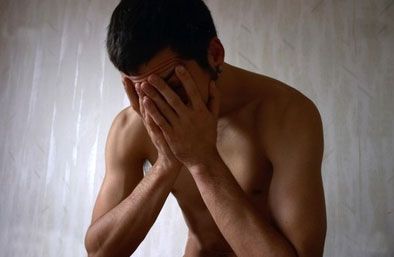Medical expert of the article
New publications
Testicular pain
Last reviewed: 04.07.2025

All iLive content is medically reviewed or fact checked to ensure as much factual accuracy as possible.
We have strict sourcing guidelines and only link to reputable media sites, academic research institutions and, whenever possible, medically peer reviewed studies. Note that the numbers in parentheses ([1], [2], etc.) are clickable links to these studies.
If you feel that any of our content is inaccurate, out-of-date, or otherwise questionable, please select it and press Ctrl + Enter.
What diseases cause pain in the testicles?
Not always painful sensations in the scrotum area can be caused by some disease. In most cases, they occur after mechanical damage - most often a blow. Although a blow to the groin area of a man can knock him off his feet, or even send him into a faint, it is extremely difficult to actually damage the testicles themselves in this way. But if the damage was caused by a sharp object (cutting, stabbing), it is necessary to seek medical help as soon as possible, so as not to completely lose reproductive function. If pain in the testicles occurs, the doctor may suspect the following diagnoses:
- Epididymitis is an inflammation of the epididymis. In fact, in this case, the pain is located in the epididymis itself, but since it is located in close proximity to the testicle, men complain of pain in it. The cause of this disease is mainly gonococci or chlamydia. These bacteria can also cause urethritis, and are most often transmitted sexually. Although, of course, there is a possibility of these bacteria getting in from the external environment.
- Testicular torsion is a more adolescent phenomenon, which is much less common in adult men. The testicle is held by the spermatic cord, which consists of the vas deferens and blood vessels. The words "testicular torsion" mean a 360-degree twisting of the spermatic cord itself. In this case, the blood supply to the testicle stops and within a few days it dies. Unfortunately, many men, not seeing signs of mechanical damage, compaction or inflammation in the scrotum, prefer to endure this terrible pain in the testicle. As we can see, this is very risky and does not lead to anything good. Surprisingly, testicular torsion most often occurs in sleep and at low temperatures.
- Orchitis is a rather rare cause of testicular pain. It is an inflammatory process, the focus of which is located directly in the testicle. Such a diagnosis is possible if the patient has had mumps, since orchitis is its complication. Many people are mistaken in assuming that orchitis after viral mumps necessarily leads to infertility. This picture is very rare. Only in 10% of cases does one testicle atrophy. And this does not affect either reproductive or sexual functions. Atrophy of both testicles occurs in exceptional cases.
In addition to the above-mentioned causes of pain in the testicles, there are a number of others:
- Unsatisfied sexual arousal. If a young man experiences it often enough, it leads to the risk of pain in the scrotum. Such pain passes over time, but, nevertheless, the discomfort from it is quite noticeable. If this situation occurs often enough, it makes sense to satisfy sexual arousal through masturbation.
- Inguinal hernia. In rare cases of prolapse of the rectum and its pressure on the scrotum, this diagnosis can provoke pain in the testicles.
- Varicocele is also extremely rarely diagnosed with this type of pain, but can still cause testicular pain.
- Psychosomatics. Sometimes testicular pain has absolutely no diagnosable causes. In this case, it is better for a man to seek help from a psychologist or psychotherapist.

What to do if you have pain in your testicles?
If you feel pain in your testicles (severe, sudden, when touched), their size and elasticity have changed, after an injury the pain in the scrotum does not subside within an hour, the pain is accompanied by an increase in body temperature and nausea, or lumpy or convex neoplasms are felt on the surface of the scrotum - you must not delay a visit to the doctor. You should contact a urologist. Testicular torsion can be detected by ultrasound diagnostics. Orchitis is not treatable, but if you did not have mumps as a child or do not remember it, then vaccination is a very effective way to prevent the disease. Treatment of epididymitis is medicinal and can be long-term.
Male strength is not only below the belt. Sometimes men can be strong enough to endure excruciating pain in the testicles, but cannot find the strength to overcome shame and go to the doctor, and this is necessary.


 [
[